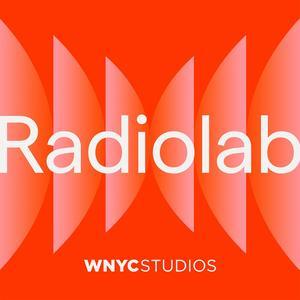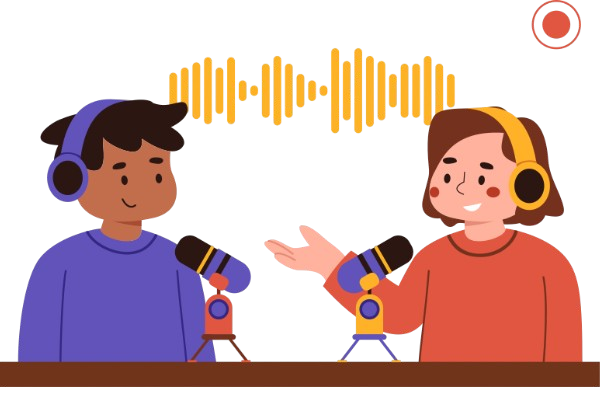Radiolab Zusammenfassung
Erhalte die neuesten Folgen und Zusammenfassungen von Radiolab direkt bei uns.

Der Radiolab Podcast
Radiolab entführt seine Hörer auf eine faszinierende Reise der Neugierde und Entdeckung. Dieser einzigartige Podcast, der von den talentierten Gastgebern Lulu Miller und Latif Nasser präsentiert wird, widmet sich der Kunst des Fragens und dem Streben nach Antworten. Jede Episode ist eine Einladung, tief in die Komplexität der Welt einzutauchen, indem sie Themen aus Wissenschaft, Geschichte und globalen Kulturen miteinander verwebt.
Mit einem unverwechselbaren Sounddesign, das Informationen und Musik zu einem harmonischen Ganzen verschmelzen lässt, gelingt es Radiolab, Geschichten lebendig und fesselnd zu erzählen. Die Zuhörer werden auf eine auditive Achterbahnfahrt mitgenommen, die von den geheimnisvollen Tiefen der Ozeane bis zu den Höhen menschlicher Erfindungskraft reicht. Ob es darum geht, die Feinheiten eines wissenschaftlichen Durchbruchs zu entschlüsseln oder die bewegende Geschichte eines Menschen am anderen Ende der Welt zu erzählen – Radiolab öffnet Türen zu neuen Perspektiven und schafft ein tiefes Verständnis für die Welt um uns herum.
Besonders für neue Hörer bietet Radiolab einen einladenden Einstieg in ein breites Spektrum von Themen, die sowohl unterhaltsam als auch erhellend sind. Es ist ein Podcast, der die Grenzen des herkömmlichen Geschichtenerzählens sprengt und dazu inspiriert, die Welt mit neugierigen Augen zu betrachten. Radiolab ist nicht nur ein Podcast, sondern eine Entdeckungsreise, die jeden Hörer dazu ermutigt, die großen und kleinen Fragen des Lebens zu erkunden.
Die besten Podcasts, ganz einfach.
Erhalte kurze und aufschlussreiche Zusammenfassungen deiner Lieblingsshows, per E-Mail, jeden Tag.
So funktioniert es

Schritt 1: E-Mail eingeben und verifizieren
Klicke auf den Verifizierungslink, den du von uns per E-Mail erhältst.
Schritt 2: Wähle aus 593 Podcasts
Wähle die Podcasts, für die du Zusammenfassungen erhalten möchtest.
Schritt 3: Erhalte Zusammenfassungen
Erhalte Zusammenfassungen in deinem Posteingang, sobald eine neue Folge erscheint.
Melde dich kostenlos an.
Kostenlos starten!Bereits Mitglied? Konto verwalten.
Letzte Episoden:
-
Match Made in Marrow
Veröffentlicht am: 03.01.2025
In an episode first reported in 2017, we bring you what may be, maybe the greatest gift one person could give to another. You never know what might happen when you sign up to donate bone marrow. You might save a life… or you might be magically transported across a cultural chasm and find yourself starring in a modern adaptation of the greatest story ever told. One day, without thinking much of it, Jennell Jenney swabbed her cheek and signed up to be a donor. Across the country, Jim Munroe...
In an episode first reported in 2017, we bring you what may be, maybe the greatest gift one person could give to another. You never know what might happen when you sign up to donate bone marrow. You might save a life… or you might be magically transported across a cultural chasm and find yourself starring in a modern adaptation of the greatest story ever told. One day, without thinking much of it, Jennell Jenney swabbed her cheek and signed up to be a donor. Across the country, Jim Munroe desperately needed a miracle, a one-in-eight-million connection that would save him. It proved to be a match made in marrow, a bit of magic in the world that hadn’t been there before. But when Jennell and Jim had a heart-to-heart in his suburban Dallas backyard, they realized they had contradictory ideas about where that magic came from. Today, an allegory for how to walk through the world in a way that lets you be deeply different, but totally together. This piece was reported by Latif Nasser. It was produced by Annie McEwen, with help from Bethel Habte and Alex Overington. Special thanks to Dr. Matthew J. Matasar, Dr. John Hill, Stephen Spellman at CIBMTR, St. Cloud State University’s Cru Chapter, and Mandy Naglich. Join Be The Match's bone marrow registry here: https://join.bethematch.org EPISODE CREDITS: Reported by - Latif NasserProduced by - Annie McEwenwith help from - Bethel Habte, and Alex Overington Sign-up for our newsletter!! It includes short essays, recommendations, and details about other ways to interact with the show. Sign up (https://radiolab.org/newsletter)! Radiolab is supported by listeners like you. Support Radiolab by becoming a member of The Lab (https://members.radiolab.org/) today. Follow our show on Instagram, Twitter and Facebook @radiolab, and share your thoughts with us by emailing radiolab@wnyc.org. Leadership support for Radiolab’s science programming is provided by the Gordon and Betty Moore Foundation, Science Sandbox, a Simons Foundation Initiative, and the John Templeton Foundation. Foundational support for Radiolab was provided by the Alfred P. Sloan Foundation.
-
Probing Where the Sun Does Shine: A Holiday Special
Veröffentlicht am: 24.12.2024
This holiday season, in a special holiday drop, we want to take you on a trip around the heavens.First, Latif, with the help of Nour Raouafi, of NASA, and an edge-cutting piece of equipment, will explain how we may finally be making good on Icarus’s promise. Then, Lulu and Ada Limón talk about how a poet laureate goes about writing an ode to one of Jupiter’s moons. We have some exciting news! In the “Zoozve” episode, Radiolab named its first-ever quasi-moon, and now it's your turn...
This holiday season, in a special holiday drop, we want to take you on a trip around the heavens.First, Latif, with the help of Nour Raouafi, of NASA, and an edge-cutting piece of equipment, will explain how we may finally be making good on Icarus’s promise. Then, Lulu and Ada Limón talk about how a poet laureate goes about writing an ode to one of Jupiter’s moons. We have some exciting news! In the “Zoozve” episode, Radiolab named its first-ever quasi-moon, and now it's your turn! Radiolab has teamed up with The International Astronomical Union to launch a global naming contest for one of Earth’s quasi-moons. This is your chance to make your mark on the heavens. Vote on your favorites here: https://radiolab.org/moon EPISODE CREDITS: Reported by - Latif Nasser, Lulu MillerProduced by - Matt Kielty, Ana GonzalezFact-checking by - Diane Kelly Signup for our newsletter!! It includes short essays, recommendations, and details about other ways to interact with the show. Sign up (https://radiolab.org/newsletter)! Radiolab is supported by listeners like you. Support Radiolab by becoming a member of The Lab (https://members.radiolab.org/) today. Follow our show on Instagram, Twitter and Facebook @radiolab, and share your thoughts with us by emailing radiolab@wnyc.org. Leadership support for Radiolab’s science programming is provided by the Gordon and Betty Moore Foundation, Science Sandbox, a Simons Foundation Initiative, and the John Templeton Foundation. Foundational support for Radiolab was provided by the Alfred P. Sloan Foundation.
-
Curiosity Killed the Adage
Veröffentlicht am: 20.12.2024
The early bird gets the worm. What goes around, comes around. It’s always darkest just before dawn. We carry these little nuggets of wisdom—these adages—with us, deep in our psyche. But recently we started wondering: are they true? Like, objectively, scientifically, provably true? So we picked a few and set out to fact check them. We talked to psychologists, neuroscientists, runners, a real estate agent, skateboarders, an ornithologist, a sociologist and an astrophysicist, among others, a...
The early bird gets the worm. What goes around, comes around. It’s always darkest just before dawn. We carry these little nuggets of wisdom—these adages—with us, deep in our psyche. But recently we started wondering: are they true? Like, objectively, scientifically, provably true? So we picked a few and set out to fact check them. We talked to psychologists, neuroscientists, runners, a real estate agent, skateboarders, an ornithologist, a sociologist and an astrophysicist, among others, and we learned that these seemingly simple, clear-cut statements about us and our world, contain whole universes of beautiful, vexing complexity and deeper, stranger bits of wisdom than we ever imagined. Special thanks to Pamela D’Arc, Daniela Murcillo, Amanda Breen, Akmal Tajihan, Patrick Keene, Stephanie Leschek and Alexandria Iona from the Upright Citizens Brigade, We Run Uptown, Coaches Reph and Patty from Circa ‘95, Julia Lucas and Coffey from the Noname marathon training program. We have some exciting news! In the “Zoozve” episode, Radiolab named its first-ever quasi-moon, and now it's your turn! Radiolab has teamed up with The International Astronomical Union to launch a global naming contest for one of Earth’s quasi-moons. This is your chance to make your mark on the heavens. Submit your name ideas now through September, or vote on your favorites here: https://radiolab.org/moon EPISODE CREDITS: Reported by - Alex Neason, Simon Adler, Sindhu Gnanasambandan, Annie McEwen, Maria Paz Gutierrez, and W. Harry FortunaProduced by - Simon Adler, Matt Kielty, Annie McEwen, Maria Paz Gutierrez, and Sindhu GnanasambandanOriginal music and sound design contributed by - Jeremy BloomFact-checking by - Emily Krieger and Diane A. Kellyand Edited by - Pat Walters and Alex Neason Sign-up for our newsletter comes out every Wednesday. It includes short essays, recommendations, and details about other ways to interact with the show. Sign up (https://radiolab.org/newsletter)! Radiolab is supported by listeners like you. Support Radiolab by becoming a member of The Lab (https://members.radiolab.org/) today. Follow our show on Instagram, Twitter and Facebook @radiolab, and share your thoughts with us by emailing radiolab@wnyc.org.Leadership support for Radiolab’s science programming is provided by the Gordon and Betty Moore Foundation, Science Sandbox, a Simons Foundation Initiative, and the John Templeton Foundation. Foundational support for Radiolab was provided by the Alfred P. Sloan Foundation.
